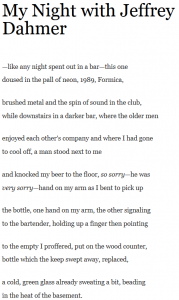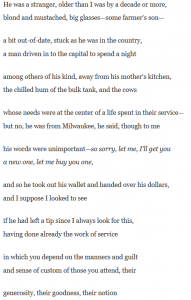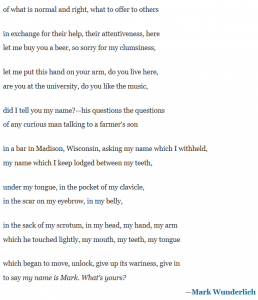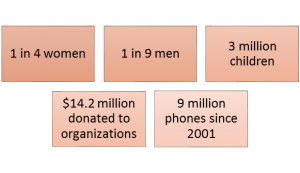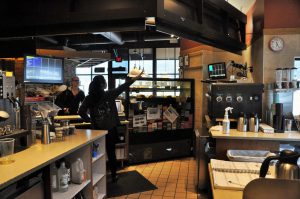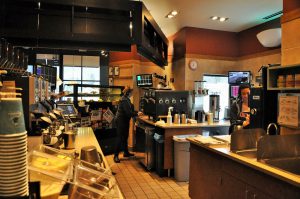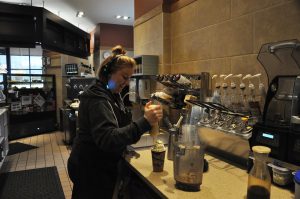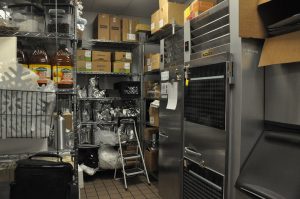An award winning poet returned to his native roots to give a poetry reading last week, bringing in a full audience to the Darrell W. Krueger Library on campus.
Poet Mark Wunderlich read from his book, The Earth Avails and new material. He is originally from Winona and grew up in Fountain City. He is visiting from Hudson Valley, where he teaches literature at Bennington College in Vermont.
The poetry reading was on the second floor, in front of the tall glass windows. Eight rows of mismatched chairs filled the space. A majority of the chairs were occupied by people of a variety of ages, college students to older people. Wunderlich stood in front of a podium, book opened in front of him. His shoulder length, gray hair was pushed behind his ears by his orange and black glasses. Contrasting the orange was his blue polka dot shirt covered by a black button up.
Freshman Shanya Julius was in the audience, and came to the event for her English class. She had read some of his poems in class.
Another freshman, Sydney Anderson was also in the audience, and likes poetry so she decided to come.
Wunderlich read a few of his poems for close to half an hour, and saved time for audience questions after. One poem he read was White Fur, about an experience in Fountain City as a child.
Some of the audience members might recognize where this poem takes place, Wunderlich said, and the rest of the country he has read this poem thinks of it as an exotic place.
Wunderlich read from the manuscript he is currently working on. He said they will be longer poems, and more meditative, different from his shorter poems he has written before.
“I didn’t set out to write a sad book, but I think this book will be kind of sad,” Wunderlich said. “Accumulation of loss but still trying to live your life.”
He read a poem about his experience with Jeffery Dahmer, and swears that everything in the poem is true. It is called My Night with Jeffery Dahmer. It is about a time out at the bar when Jeffery Dahmer knocked over his beer, and started a conversation with him. Wunderlich wasn’t interested in talking to him, but found himself speaking to him. He didn’t think anything of it until sometime later, when he saw his face on the news.
It was a chilling moment when he recognized him, Wunderlich said, after an audience member inquired about it during question time.
Julius and Anderson, the attending freshman, both enjoyed the poem.
“The way he read the poem made it stand out,” Anderson said.
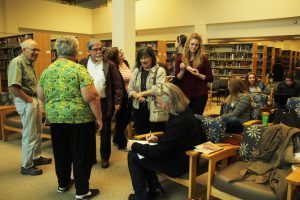
After the poetry reading, Wunderlich went over to Blue Heron with advanced creative writing students to read two poems to open their poetry reading session. He also spent time with their classes that day and the day before.
Wunderlich’s visit was part of the Great River Reading Series, where two poets and two fiction or nonfiction writers are invited to campus to visit classes and read from their works, according to Professor Jim Armstrong.
Wunderlich visited Armstrong’s writing classes and also professors Deb Cumberland’s and Elizabeth Oness’ creative writing classes.
“They loved him…they wanted selfies with him…they couldn’t believe he wasn’t an old, crabby man they said,” Armstrong said about his students meeting Wunderlich.
Wunderlich started writing in college, when he accidently ended up in a creative writing class but decided to stay.
“On the first day we read a poem by Wallace Stevens and thought this is all I ever want to do,” he said. “I was having a conversation that I had waited my whole life to have…I remember this palpable excitement. I just thought I want to keep doing this.”
He said he writes in his 300 hundred year old house in his office, which has a 14 foot ceiling. One wall is entirely bookshelves. He has a ladder to access them all. A long, skinny desk sits near the bookshelves, and Wunderlich sits with the books behind him.
“This feels to me like the best arrangement, I am facing toward nothingness, the empty page, while behind me are all the books of poems, and all the writers I love,” he said. “There they are. They got my back.”
He loves many authors, but mentioned Emily Dickinson and Walt Wittman. He also loves his peer writers.
In addition to poetry, Wunderlich also writes nonfiction, essays, book reviews and criticism. He currently has three books out, available for purchase through Amazon. He currently is working on a fourth.

